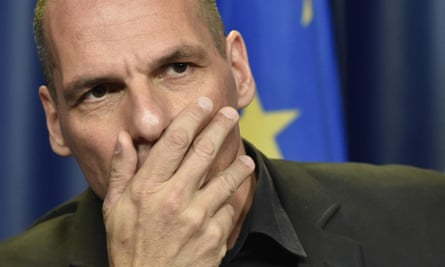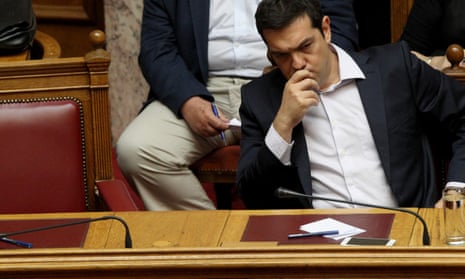Vicky Pryce: ‘We should never have got to this point’
The shock decision of Alexis Tsipras to call a snap referendum for 5 July, just like the socialist prime minister George Papandreou had tried to do in 2011, has torpedoed any chance of reaching an agreement this weekend. Greece will almost certainly default, or at least will get into arrears if it refuses to – or simply can’t – pay the 1.6bn euros it is due to the International Monetary Fund on 30 June.
The institutions are not granting a deferment of the payment, or an extension of the bail-out, while the referendum preparations take place. There is a real worry about the banking system’s survival and continued European Central Bank (ECB) emergency liquidity assistance. Many banks have already run out of cash as Greeks rushed to the ATMs to take out whatever they had still in their bank accounts.
We should never have got to this point. Both sides are equally to blame here. The risks are immense – political and economic, for Greece and the eurozone. The Greek government is framing the campaign as a ‘no’ being a vote against austerity. A ‘yes’ means acceptance of more pain to come. But what they are not telling their people is that in reality both proposals impose broadly similar levels of austerity – the main difference being where the pain is felt. And what they are also not admitting is that what they are recommending people should vote for is effectively to leave the euro – even ultimately the EU – which the population does not want to see happen.
But the Greeks are not stupid. Any chaos in the coming week, involving bank holidays and capital controls, will focus minds. That hope alone might convince the ECB to keep support to the banks still available, in theory at least, until the vote.
David Blanchflower: ‘The worry is if the inevitable default spreads’
Referendum or no referendum? Euro-area finance chiefs rejected a Greek request for an extension of the country’s bailout. The odds are now starting to look like a Grexit from the euro, although probably not from the EU.
Worryingly, there are growing lines at ATMs, and so much money is being withdrawn that without further injections of money the banks will be insolvent. But the average Greek saver is still well advised to withdraw from the banks all the money they have left. Now. Capital controls still seem likely. There is zero evidence that the Greek economy is going to recover from another bout of unneeded austerity, however big it is; austerity doesn’t work. But going back to the drachma at least offers a burst of stimulus as the currency depreciates, pulling in tourists for cheap vacations.
The Greek people have had it up their necks with failed austerity that was supposed to deliver growth, but delivered a depression worse than that in the 1930s in the US. Since the imposition of austerity in 2010, GDP has fallen 25% and is down 31% since the start of the crisis in 2008. Currently, the Greek unemployment rate is 25% and youth unemployment is more than 50%. Happiness measures collapsed since austerity began, and now the Greeks are the most miserable in the Organisation for Economic Co-operation and Development.
The reality is that Greece has a highly uncompetitive economy and no credible tax collection system. The problems mostly are in the product, capital and housing markets that remain unaddressed. According to the World Bank’s Doing Business rankings, Greece ranks 61st, just behind Tunisia. Greece is 155th in the ability to enforce contracts, just ahead of Laos and Botswana. There has been no reform to speak of. Greece is characterised by endemic tax evasion, a poor tax collection infrastructure, parochial patronage policies, corruption and huge delays in the administrative courts dealing with tax disputes. Greece also has deep structural problems, mostly in product markets with oligopolies in almost every industry, closed professions, administrative and bureaucratic impediments to entrepreneurship alongside barriers to trade and exporting, none of which have been addressed. This baby certainly isn’t over. The worry is if the inevitable Greek default spreads.
Mariana Mazzucato: ‘This cannot be fixed by cuts and more cuts’
The failure to reach an agreement in Greece is because, from the start, the diagnosis has been wrong. So in the end, the patient got sicker – and now wants to stop being treated.
As Greece’s finance minister Yanis Varoufakis has been repeating from the beginning of this crisis, Greece did not have a liquidity crisis, but a solvency crisis. The latter was caused by a competitiveness crisis and made worse by the financial crisis. And this kind of crisis cannot be fixed by cuts and more cuts, but only by a serious investment strategy, accompanied by serious – not token – reforms (e.g. to how the state, and hence also taxation, is run) to bring back competitiveness.

The conditions of the bailout therefore should have been conditions that emulate the kind of public sector reform and investment strategy that characterises many of the competitive powerhouses of northern Europe – including Germany. Indeed, Greece should not do what Germany says it does (austerity), but what Germany actually does (invest).
Over the last decade, Germany has invested in all the key areas that not only increase productivity, but also create innovation-led growth. Companies like Siemens are the result of a dynamic public-private eco-system in Germany, with high government spending on science-industry links (Fraunhofer institutes), the existence of a large and strategic public bank (KfW) that provides patient, long-term, committed capital to German businesses, a long run-focused stakeholder type of corporate governance (rather than the short-termist shareholder Anglo-Saxon model that southern Europe has copied), an above-average R&D/GDP ratio (rather than the below average one in Greece, Portugal and Italy), investments in vocational training and human capital, and a mission-oriented ‘energiewende’ strategy focused on greening the entire economy.
Imagine the very different types of result we would have witnessed had the negotiations been about stuffing an investment strategy down Greece’s throat, rather than more cuts. “OK, we will bail you out, but reform your country, and kickstart public investments (of the type named above), so that you are ready for the 2020 innovation challenge.”
Instead, insisting on the status quo full of more austerity produced an increasingly weaker Greece, more unemployment and more loss of competitiveness. Now alone, the only hope is that Varoufakis’ insistence on a European-wide investment programme will at least find a national solution. Perhaps it can begin with Greece forming a development bank like the KfW, and use it to kickstart the kind of long-term investment strategy that should have been part of this ‘pact’ from the start. Oh, and Italy’s competitiveness is just as bad. So if Grexit now happens— and Europe does not finally get a proper doctor in the room – get ready for Itexit over the next year.
